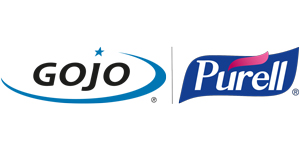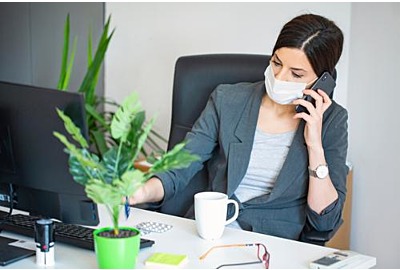The pandemic with the corona virus will accompany us for quite some time. Here are six hygiene measures that will help in working life.
Hygiene tip number one: washing hands
Washing hands is one of the most important infection prevention measures. However, it is only effective if these rules are observed:
- Moisten your hands with water.
- Apply soap, lather hands.
- Wash your entire hands for at least 20 seconds - including the back of your hands, the space between your fingers and under your nails.
- Then rinse your hands thoroughly with running water.
- Dry your hands with a clean cloth.
Washing hands is important in these situations:
- After blowing your nose, coughing or sneezing
- After visiting public transport or supermarkets
- After touching surfaces
- Before and after the meal
- After going to the toilet
- After waste disposal
- After touching animals
- In case of visible soiling of the hands
Hygiene tip number two: Hand disinfection
Currently, the supply of hand disinfectants is scarce and manufacturers of hand disinfectant solutions are advising employers not to purchase large quantities. The primary purpose of this is to ensure the supply of hygiene solutions to the healthcare sector. However, companies that still have hand disinfectants from previous years can make them available to their employees. Hygienic hand disinfection offers even greater effectiveness against pathogenic germs than hand washing.
- Rub the palm of the hand against the palm of the hand.
- Rub right palm over the back of the left hand and left palm over the back of the right hand.
- Rub palm on palm with crossed, spread fingers.
- Rub outside of fingers on opposite palms with interlaced fingers.
- Rub right and left thumb.
- Rub closed fingertips into right and left palm.
Repeat these steps repeatedly within 30 seconds. This ensures optimum effectiveness.
Hygiene tip number three: Surface disinfection
Corona viruses can remain on door handles or surfaces for up to three days. Caution is required here in the operational environment. Surface disinfection helps.
- Do not wipe dry.
- Do not use disinfectant sprays or hygiene wipes on damp or wet surfaces.
- Electrical equipment to be disinfected must be disconnected from the power supply beforehand.
- Visible soiling must be removed with a disposable cloth soaked in disinfectant before starting disinfection with a disinfectant spray.
Hygiene tip number four: Keep distance
Viruses and bacteria are transmitted by tiny droplets that are created, for example, when people sneeze. A few precautions should be taken to prevent them from landing on others:
- Keep a distance of two meters between you and others.
- In offices, move desks as far as possible away from each other.
- In canteens, set up more desks so that employees can move far away from each other.
- If possible, let employees work at home for as long as possible during the pandemic.
- Meetings can either be held via video conference.
- Mandatory at the office meetings should be kept as short as possible and held in a well-ventilated room.
- Avoid any touching and shaking hands.
Hygiene tip number five: Wear a mask
Medical masks for mouth and nose are currently hard to get. However, there are numerous instructions for homemade masks. They can reduce the risk of infection on the way to work on trains and buses.
- Mouth and nose masks must be multi-layered and fit snugly around the edges of the face.
- A pocket in which a medical fleece can be inserted and regularly replaced further increases the protection.
- Wearers should only touch the mask at the straps and wash their hands before putting it on.
- After using buses or trains, it is important to wash your hands thoroughly before removing the mask.
- Wash or disinfect your hands again.
- Hang the mask up to dry.
- The mask should not be shared with anyone.
- If the inside could be contaminated with contaminants: Wash the mask at least 60 degrees with a mild detergent.
Hygiene tip number six: Observe coughing and sneezing label
It is not advisable to hold your hand in front of your mouth when coughing or sneezing. This way pathogens get onto your hands and can then be passed on to others. In offices, industry and other sectors, employers should make their employees aware of appropriate coughing and sneezing etiquette:
- When coughing or sneezing, keep at least one meter away from other people and turn away.
- Sneezing or coughing is best done in a disposable handkerchief, which should be disposed of immediately afterwards.
- If no handkerchief is available, employees should cough or sneeze in the crook of their arm and turn away from others.
Stay healthy!













